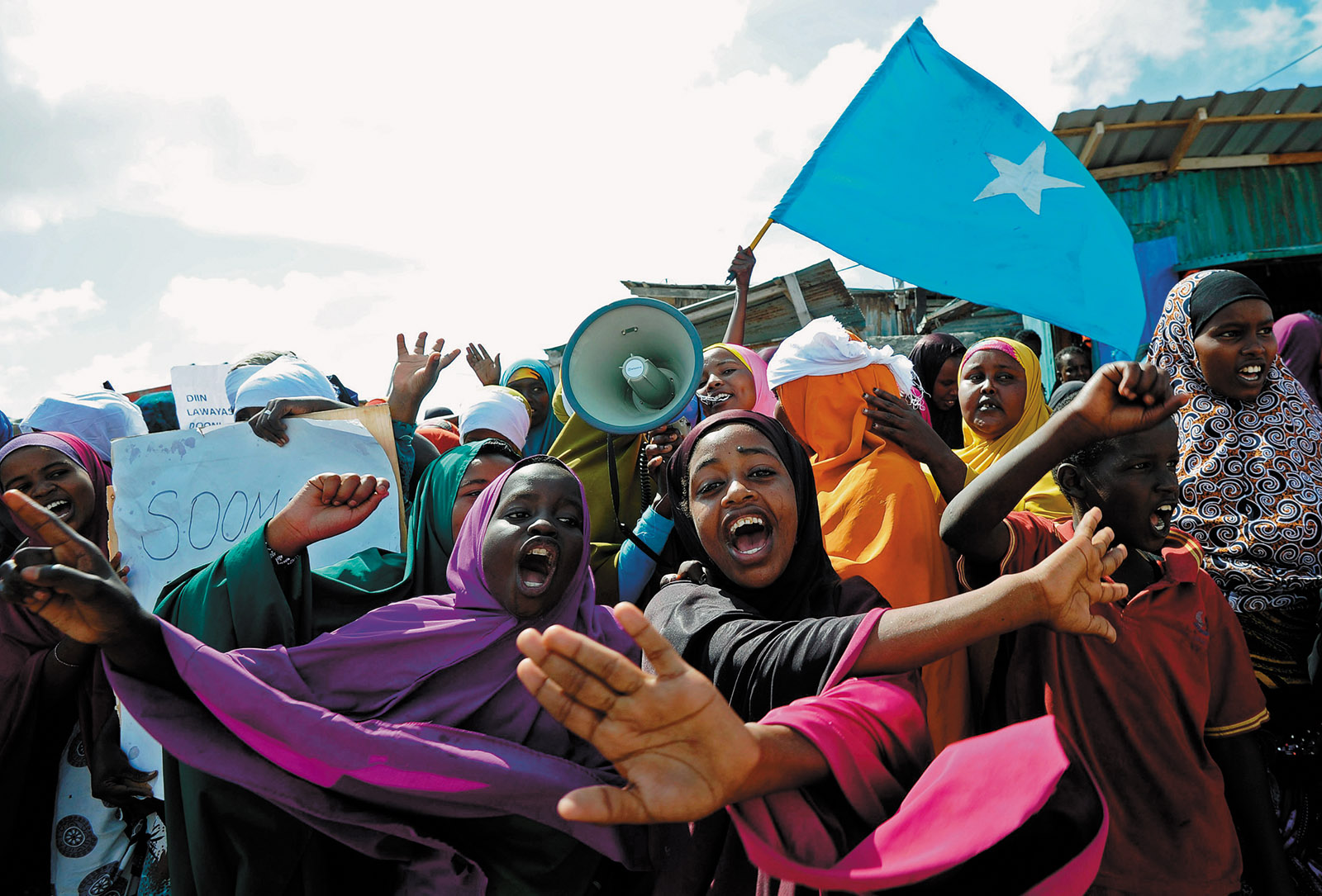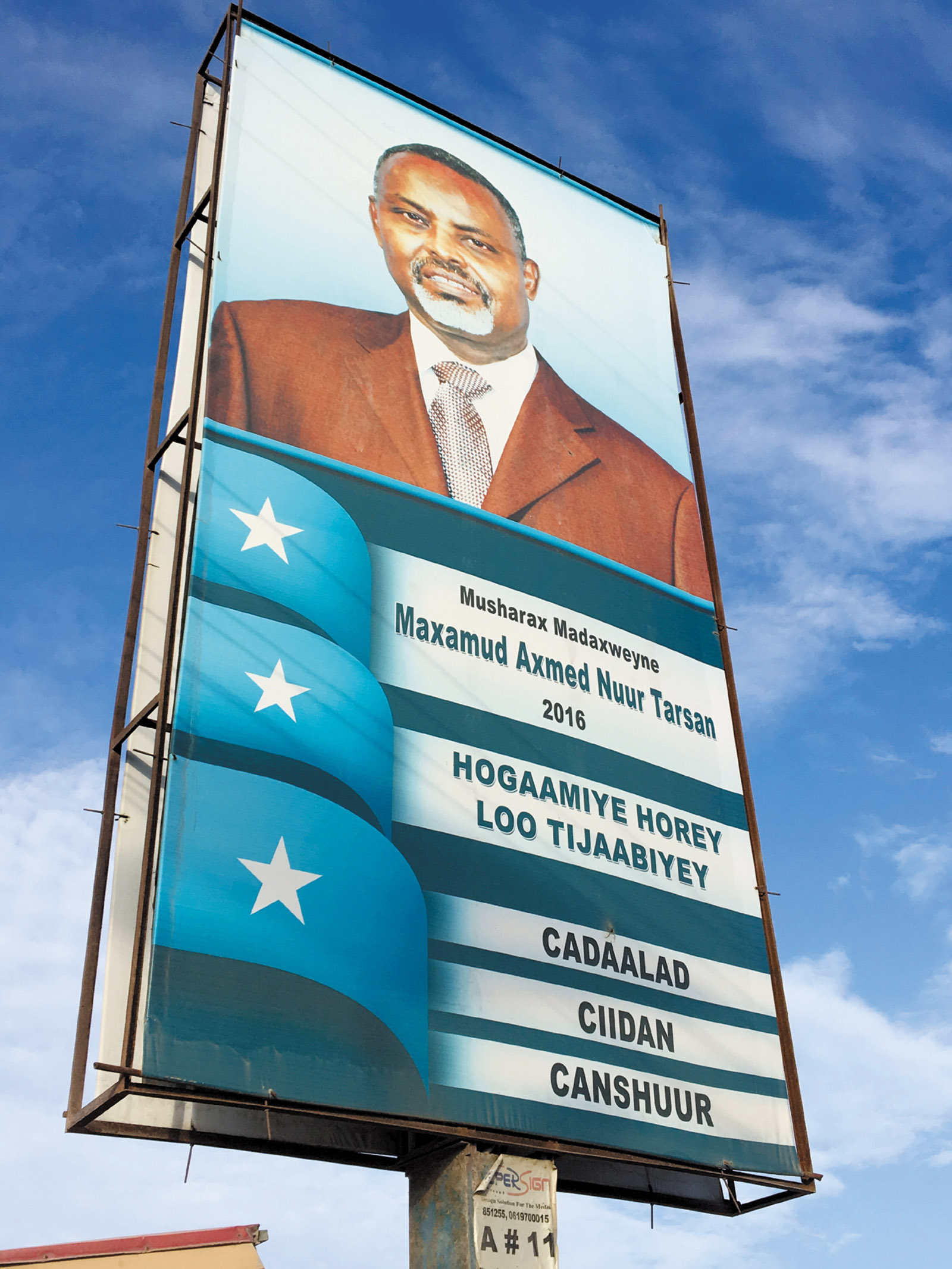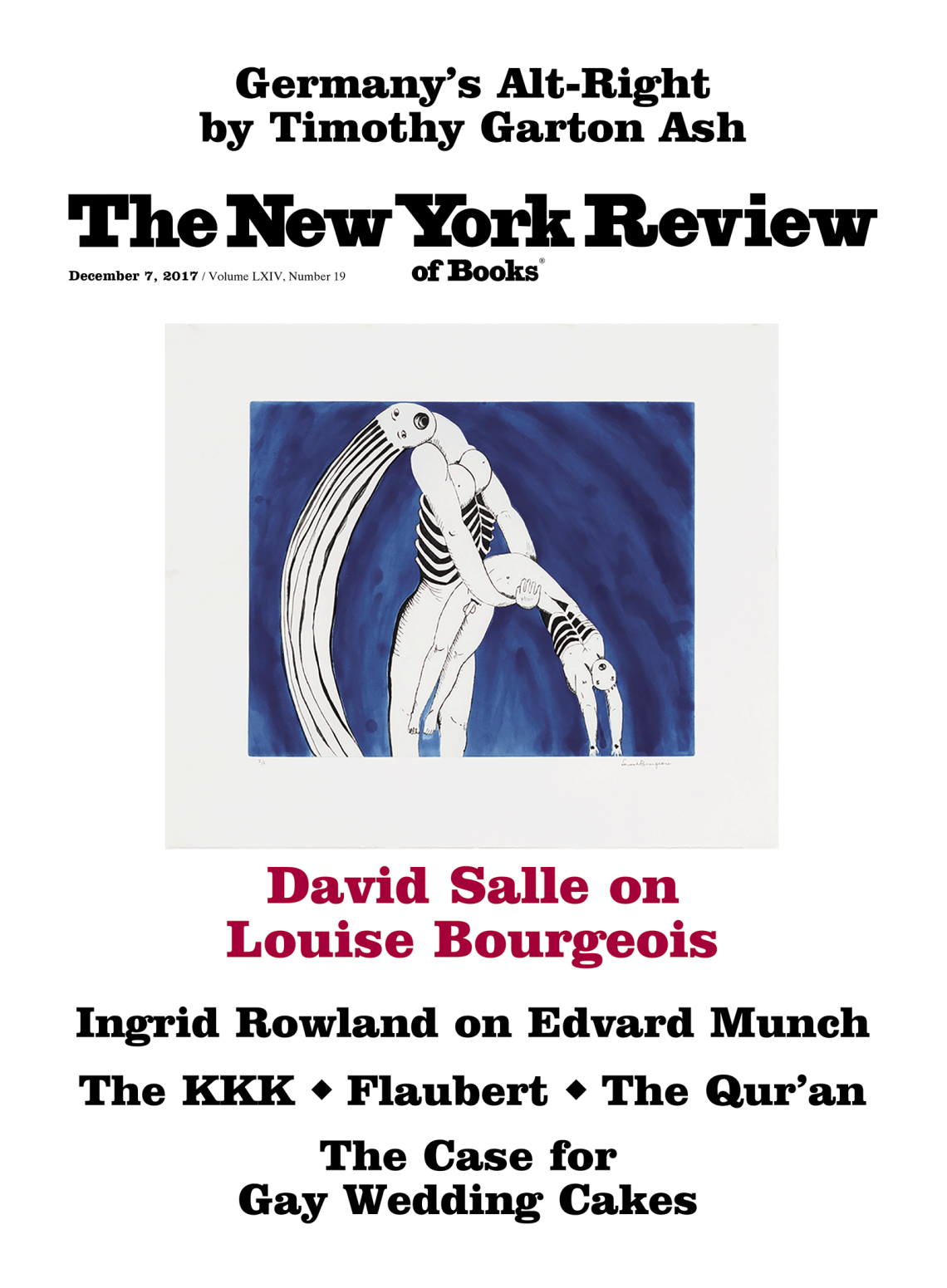For the past several decades, Somalia has been one of the poorest and most turbulent nations on earth. But in recent years the country has begun to edge away from chaos. Airplane passengers no longer fall silent as their plane descends into Mogadishu airport, which lies right next to the sea. They are greeted by a shuttle bus rather than a battered pickup truck filled with militiamen in threadbare camouflage. Neighborhoods heaped with rubble are sprouting new houses, new hotels, new shops, new roads, new solar-powered street lamps, and (once unimaginable) new cafés.
Though violence remains a fresh memory and still occurs, a growing number of Somali professionals and entrepreneurs have returned from all over the world to reclaim their old houses, old businesses, and old lives. They are determined not to let the occasional bomb or terrorist attack scare them off again. Diners in Mogadishu’s new restaurants and pizzerias look up for an instant when explosions rattle the windows but then go back to their plates. Of course, there is a limit to this. A double truck bombing in mid-October killed more than 250 people, deeply unsettling the city.
Once an Italian colony, Somalia had an odd history during the cold war, switching abruptly in the 1970s from a Soviet client state to a staunch American ally. When the cold war ended, so did American support for Somalia’s dictator, Siad Barre, and an alliance of clan-based faction leaders brought down Barre’s government in 1991. They soon turned on one another and none emerged strong enough to run the country. The modern nation-state of Somalia disintegrated into fiefs, with militias and warlords terrorizing the country, and a famine soon broke out. The United States tried to intervene, sending in tens of thousands of soldiers in the early 1990s, but the mission failed and Somalia sank into deeper disarray. Most of the people who died during this period were starving children.
From this upheaval, an Islamist movement gradually arose. By 2006 an alliance of Islamist sheikhs and militias had defeated the warlords. Somalia enjoyed a few months of relative peace but then was plunged back into violence when neighboring Ethiopia invaded, and, with American help, overthrew the Islamists and installed a puppet government that controlled no more than a few city blocks. The government essentially redeployed many of the same warlords who had destroyed Somalia in the first place. One of the Islamist militias, al-Shabab, emerged as a powerful insurgent force, exploiting the country’s widespread antigovernment feeling to recruit thousands of young men and vowing to turn Somalia into a strict Islamic state. Soon, with al-Qaeda’s help, al-Shabab began staging devastating attacks across Somalia.
Foreign powers, including the United States and the European Union, under the auspices of the UN Security Council, deputized the African Union to send in peacekeepers and push al-Shabab out. The effort has been partly successful, allowing a slightly more stable and popular government to coalesce, although al-Shabab forces still massacre peacekeepers and civilians. This is where Andrew Harding’s book, The Mayor of Mogadishu: A Story of Chaos and Redemption in the Ruins of Somalia, begins. Harding is a BBC journalist who has logged many miles in Somalia as a foreign correspondent for radio and television. His book describes a charismatic, cunning, deceitful, and at times inspiring mayor, Mohamud Nur, better known as “Tarzan,” who served as the hard-charging leader of Mogadishu from 2010 to 2014, a period that turned out to be crucial.
Tarzan grew up in a Mogadishu orphanage in the mid-1960s and early 1970s, during relatively good times. Mogadishu was a lively and peaceful capital, known for its hybrid of Italian and Arab architecture and its long beaches. Couples went out for evening strolls; the city’s many cinemas showed Italian films; on weekends the beaches were packed. At the time, Barre seemed firmly in control. Somali officials often earn nicknames (Barre’s was “Big Mouth”), and Tarzan got his from an incident when he was around eight and tried to get out of his morning duties. A teacher discovered him hiding outside his dorm room, half naked and hanging from a tree.
Life in a Somali orphanage was as squalid and Dickensian as one could imagine, and Tarzan grew into what was essentially a capo, always happy to rough up a rival. But he credits the orphanage with inspiring his brand of nationalism. Rejected from their families and disconnected from their lineages, Mogadishu’s orphans banded together, resisting Somalia’s traditional lines of division. In a society deeply riven by clan, the orphans built their own clan.
By the late 1980s, Tarzan sensed that Somalia was about to unravel. Barre was corrupt, isolated, and venal, and he had alienated every major subclan except his own, the Marehan. Many Somalis say they always suspected Barre’s government would buckle. The surprise was that no alternative regime ever materialized to replace it.
Advertisement
After Barre was ousted in 1991, the horde of clan militias sacked Mogadishu. Stocked with child soldiers chewing khat, a leaf that produces a slight high, the militias behaved like street gangs armed with cold war surplus weaponry. They fought on every block and corner and blew up anything in their path.
Anybody who could get out of Mogadishu did, and Somalia began hemorrhaging more than a million people. Tarzan, who had been working in Saudi Arabia as a cook and a truck driver, among other jobs, moved to London, where his wife and six children had lived for a few years. He struggled at first but eventually found work as a refugee counselor and community activist among London’s growing Somali population. When the Islamists took over Somalia in 2006, Tarzan felt drawn in. He liked the Islamists; their authority was not tied to clan.
In 2009, a peace accord between the weak government and several Islamist factions brought Sharif Sheikh Ahmed, a former geography and religion teacher, to power as Somalia’s first Islamist president. When Sheikh Sharif asked Tarzan to be Mogadishu’s mayor, Tarzan’s initial reaction was no: “It’s a mess, and I don’t want to get dirty.” He had no real administrative experience, but as Harding writes, “this was a government without a country—an expression of ambition, rather than of ability, a wobbly alliance of competing clan interests parachuted into one corner of a ruined city.”
That is one of my favorite sentences in the book and there are many others. Harding is a writer of enviable powers and he brings a lot of empathy to his work. His book is one of the best in recent years to decipher Somalia, a nation that has grabbed much attention but remains opaque. He deftly takes apart clan dynamics and writes about the “acid jolt of mutual resentment” between the Somalis who remained in Somalia through the war years and those, like Tarzan, who returned only after things had improved. Harding also had wonderful access. Having won Tarzan’s confidence early in his mayoralty, he spent hours with him in his fortified office, in the family house in Mogadishu, and in Tarzan’s crowded London flat.
Tarzan’s biggest worry was the one shared by most visitors to Somalia, including myself: personal survival. On his first night back in Mogadishu, al-Shabab—seeing him as a stabilizing force and therefore a threat—launched rockets at his hotel. Harding’s book begins with an al-Shabab attack on a heavily protected mosque where Tarzan was praying with such concentration that he didn’t seem to notice, until he had finished, that several people next to him had just been shot.
Tarzan never admitted to being scared. “The hour of my death has been written. I cannot change it,” he said again and again. Even after a minister friend was assassinated in his living room by his own niece (an undercover al-Shabab suicide bomber), Tarzan kept up his fearless front. “I don’t afraid anyone,” is how he often put it, in his self-taught English. Despite his attempts, Harding admits that he doesn’t quite succeed in getting Tarzan to open up, so it’s difficult to know how much of Tarzan’s bravado was playing to the cameras or a deeper indication of a battle-hardened orphan emotionally protecting himself once again. Al-Shabab was a deadly threat that would menace Tarzan for his entire term in office; maybe the only sustainable way of dealing with it was being fatalistic. Even though al-Shabab no longer enjoyed widespread popularity, they still recruited devout followers willing to drive trucks into walls and strap on explosives, killing thousands of people. Tarzan survived several very close calls.
Tarzan’s first efforts as mayor were to clean up the city. He helped install streetlights and get Mogadishu’s roads paved, drawing on international funds and expertise. Turkey, for instance, began to show an unusual interest in Somalia and donated millions of dollars to improve infrastructure. The Turks remain boosterish about Somalia’s commercial prospects and have been running the country’s airport and seaport ever since. (Revenues from the seaport are opaque. Some of Tarzan’s colleagues have accused him of stealing them.) Turkey, along with the United Arab Emirates, Egypt, and Qatar, see Somalia as an emerging market and potential ally in northeast Africa.
Tarzan both contributed to and benefited from the changes in Mogadishu. When he came into office in 2010, al-Shabab controlled much of the city. The government was indeed clinging to a small corner, protected by African Union troops. But as the African Union expanded its zone of relative peace, businesspeople and others began to invest and confidence in the economy slowly began to grow. People started moving back into the center of the city. Real estate prices went up. The first dry cleaners in decades opened. After years of hopelessness, Mogadishu looked like it was finally going to turn around.
Advertisement
The city was safer but it still wasn’t safe. Nearly every day, large bombs exploded, and Tarzan constantly received death threats, usually by text message: “WE ARE FROM YOUR CLAN, SO WE KNOW EVERY MOVE YOU TAKE.” “YOUR FLESH WILL FLY INTO THE AIR.” “IN TWO MINUTES YOU WILL BE DEAD.”
Mogadishu remained overwhelmed by competing clan, religious, business, and external interests. Many contract disputes were settled with machine guns. Tarzan seemed to enjoy widespread popularity among Mogadishu’s beleaguered residents, who turned out in great numbers for his rallies. But he was, in a way, too Westernized by his years in England and wanted to move too fast. He had little patience for his Somali colleagues who liked to discuss things at great length over endless glasses of tea. Too often in his public speeches he dropped references to London that few Somalis understood. He was also openly ambitious, frequently talking about his plans to become the next president.
Soon Somali intellectuals and detractors inside the government accused him of favoring his own small clan, the Udeejeen, stealing government revenue, and even ordering the murder of a Somali television journalist who had been critical of his administration. The journalist was shot to death by government soldiers suspected of being part of Tarzan’s security detail. No one was ever punished. This was hardly the reason Tarzan was fired in 2014, though—Somalia’s then president, Hassan Sheikh Mohamud, said he had let him go to get rid of “the baggage of the past.”
Tarzan departed reluctantly and with a checkered reputation. The book ends soon after his dismissal, but his political ambitions have lived on. Last February, true to his word, he ran for president against more than a dozen other candidates. But this wasn’t an election as most of us think of one; “indirect’’ election was the euphemism that Western diplomats used. Around 14,000 clan-based delegates from across Somalia selected parliament representatives who would in turn select a president. There weren’t organized political parties or big differences in the issues that candidates emphasized. Western diplomats, including an American team tasked with watching the process closely, said indirect elections were the best Somalia could do, given the shambolic state of the country’s public institutions and the insecurity—having people line up at polling stations seemed too dangerous. In one of Tarzan’s campaign billboards, decorated with Somalia’s blue and white flag and a picture of him in an ochre suit, he stares out boldly, wearing a white goatee, “already tested leader” written beneath his chubby face. Below appears a list of the three things he thought Somalia needed most: Justice, Army, and Tax. Many of the other candidates put similar slogans on their posters.
After years of being ambivalent about Somalia, the American government has invested heavily in trying to stabilize it. In the past decade, Somalia has received billions of dollars in American humanitarian aid and security assistance. The Pentagon has recently built a string of dust-blown bases from which Marines and Navy SEALs carry out covert anti-Shabab operations. American and United Nations officials were initially excited about this round of elections, calling them “a milestone.’’ In the end, the elections became a milestone in corruption.
Several presidential candidates secretly raised millions of dollars from foreign governments that were eager to protect their business and strategic interests in Somalia, such as Turkey, the United Arab Emirates, Qatar, and Egypt. The leading candidates then used that money to bribe elders and members of parliament in an attempt to buy their votes. One investigator, Abdirazak Fartaag, a former Somali government official, estimated that at least $20 million changed hands in the weeks leading up to the vote—a lot of money in a country with a per capita income of about $1 per day. Many Western diplomats privately agreed with Fartaag’s estimate—he said every stage of the election was crooked and some parliament seats went for a million dollars each. Tarzan grumbled that he didn’t have enough money to compete and that the whole system was worthless. He got two out of 328 votes and was excluded in the first round.
Surprisingly, a relatively clean candidate won the race. His full name is Mohamed Abdullahi Mohamed, but most Somalians know him as Farmaajo, from the Italian formaggio (cheese), for which his father was said to have a fondness. Farmaajo was a Somali-American refugee who spent years in a cubicle in Buffalo, New York, working for the state transportation department. It seems that due to protections for secret balloting the bribes did not in the end influence the outcome—apparently many parliamentarians happily pocketed the bribe money but voted for whomever they liked.
The election hardly brought an end to the country’s troubles. Thousands of children in the country still die of malnutrition every year; countless others are swept up in the conflict, on one side or the other. Al-Shabab still kills scores of people, and October’s double truck bombing, widely suspected of being carried out by al-Shabab agents, was one of the most devastating incidents of violence in Somalia’s history. And this year, partly because of a drought, millions of Somalis are again on the brink of famine. While many Somalis respect President Farmaajo for being a hard worker, his administration does little for most Somalis. It doesn’t have the funds, the personnel, or the reach.
All that said, Somalia is making some progress. Mogadishu, its biggest city by far, is more vibrant than it has been in decades. A gutsy group of Somali businesspeople probably deserves much of the credit. It is their continual investment and optimism, more than anything Tarzan or other politicians have done, that keeps the dreams of a renaissance alive. On a recent visit, I stood on the roof of a new apartment building looking across the city. Mogadishu an hour after sunset used to be impenetrably dark and eerily quiet. Now I heard car honks, music, and bits of conversation drifting up from below. Bright lights burned all the way to the horizon.
This Issue
December 7, 2017
Norwegian Woods
Ku Klux Klambakes
Outing the Inside




